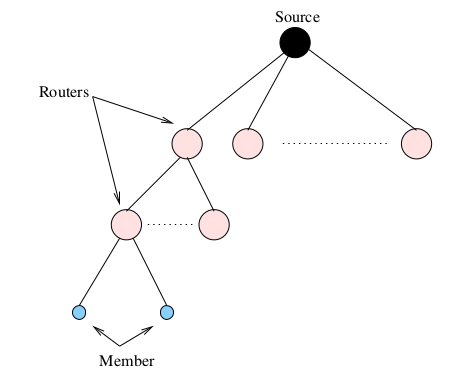
Links
Abstract
Typically, multicast data distribution uses rendezvous points (PIM, CBT), multicast distribution tree building protocols, and multicast forwarding. Whereas the first two approaches have been extensively studied, scaling multicast forwarding state without increasing forwarding complexity has not been addressed in detail. Having a scalable strategy for aggregation of multicast forwarding state is essential for inter-domain multicast which could have any number of concurrent multicast groups, especially in applications such as event notification and web cache invalidation mechanisms. We first present the essential characteristics of a scalable multicast routing mechanism. We then introduce and analyze, according to these metrics, a scalable aggregation mechanism for multicast-based update and change distribution based on imprecise (too generous) aggregation. Our mechanism is simple to implement, requires no additional information about the groups, and allows important savings in routing table size and routing protocol overhead, at a minimal expense in additional network and end-system traffic.
BibTeX (Download)
@inproceedings{Norden2002Imprecise,
title = {Imprecise Multicast Routing for Scalable Information Distribution},
author = {Samphel Norden and Marcel Waldvogel},
url = {https://netfuture.ch/wp-content/uploads/2002/norden02imprecise.pdf},
year = {2002},
date = {2002-02-01},
urldate = {1000-01-01},
booktitle = {Proceedings of International Zurich Seminar (IZS) 2002},
pages = {14-1 -- 14-6},
address = {Zurich, Switzerland},
abstract = {Typically, multicast data distribution uses rendezvous points (PIM, CBT), multicast distribution tree building protocols, and multicast forwarding. Whereas the first two approaches have been extensively studied, scaling multicast forwarding state without increasing forwarding complexity has not been addressed in detail. Having a scalable strategy for aggregation of multicast forwarding state is essential for inter-domain multicast which could have any number of concurrent multicast groups, especially in applications such as event notification and web cache invalidation mechanisms. We first present the essential characteristics of a scalable multicast routing mechanism. We then introduce and analyze, according to these metrics, a scalable aggregation mechanism for multicast-based update and change distribution based on imprecise (too generous) aggregation. Our mechanism is simple to implement, requires no additional information about the groups, and allows important savings in routing table size and routing protocol overhead, at a minimal expense in additional network and end-system traffic.},
keywords = {Bloom Filters, Fast Routers, Multicast},
pubstate = {published},
tppubtype = {inproceedings}
}



